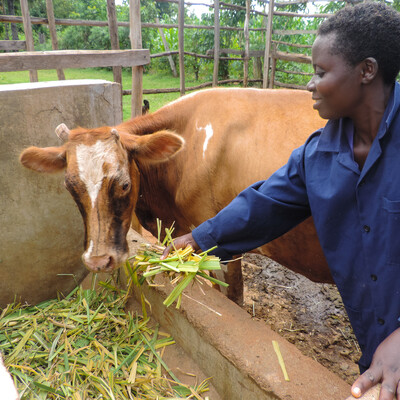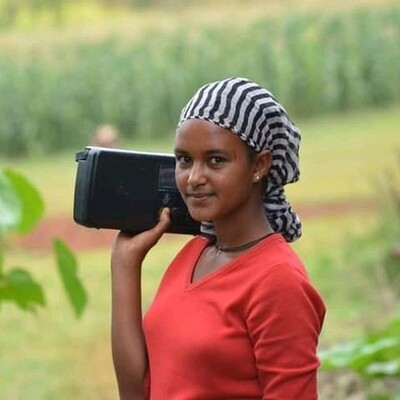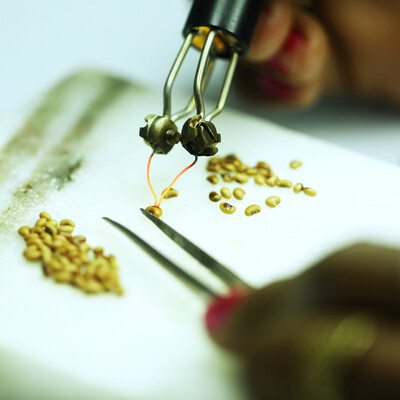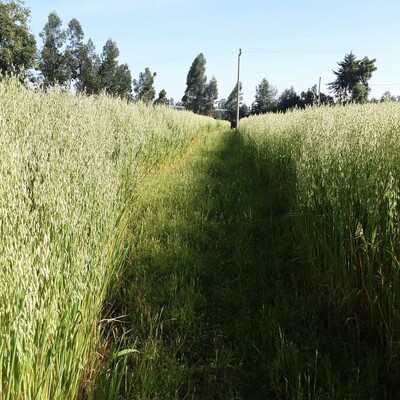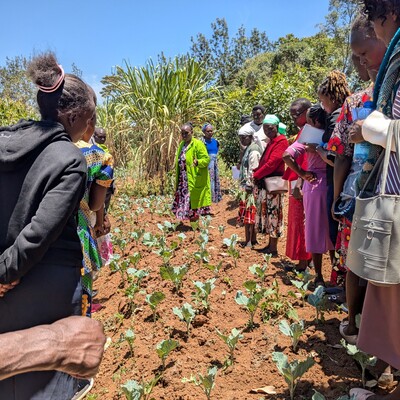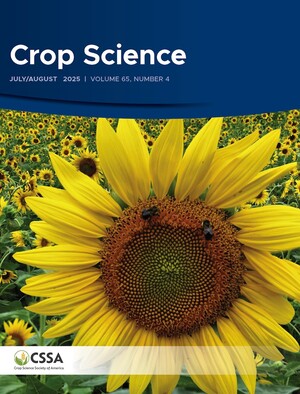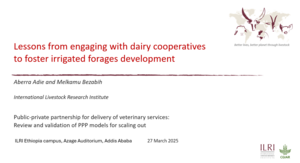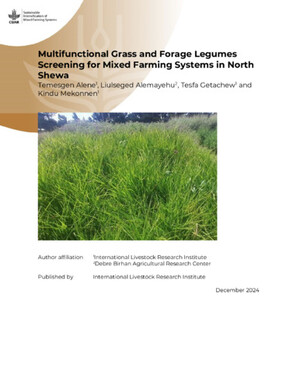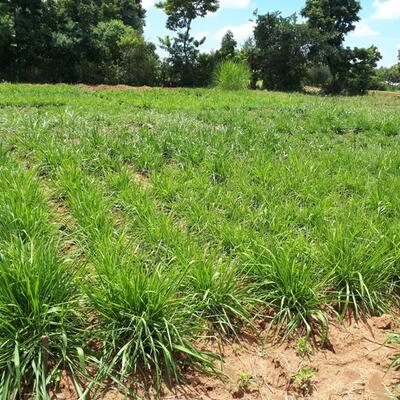
‘Legacy Award’ bestowed on Jean Hanson, ILRI’s forage genebank gatekeeper for the last three decades

Artwork from Australian visual artist Sophie Munns.
For the last 31 years, Jean Hanson, a British genetic resources specialist by training, has managed and helped others to manage forage genetic resources research at the International Livestock Research Institute (ILRI), in Addis Ababa, Ethiopia, and Nairobi, Kenya. The career of Hanson, known with enduring respect and affection by her colleagues and collaborators as ‘Jean of the Genebank’, has included managing the world’s only genebank dedicated wholly to forages, overseeing ILRI’s forage seed production and conservation work, and running the institute’s Forage Diversity Project.

Photos of the seven personalized awards created by artist Sophie Munns, by Luis Salazar/Crop Trust.
Along with six other distinguished scientists, Hanson today, 25 Feb 2018, received an inaugural ‘Legacy Award’ from the Global Crop Diversity Trust, which bestowed this award on Hanson for dedicating her career to forage conservation. Hanson and the other recipients received personalized awards featuring specially commissioned artwork by Sophie Munns. The individual recognition of all seven of these crop and forage diversity ‘gatekeepers’ came as part of the 10th anniversary of the Svalbard Global Seed Vault.
The award ceremony took place in Svalbard, Norway, and coincided with the latest shipments of more than 70,000 seeds to the iconic Seed Vault built on an Arctic island—a natural deep freeze to back up the world’s genebanks in case of disasters ranging from nuclear war to global warming. The latest shipments of seed samples take the total number deposited in the vault over the last decade to more than one million. Deposits are made by genebanks from all over the world, to back up their own collections safely and securely.
Several of the Crop Trust Legacy Award recipients, including ILRI’s Jean Hanson, are retiring managers at the vitally important genebanks of CGIAR, which conserve and share hundreds of thousands of seeds of food and forage crops. Duplicates of seeds from CGIAR genebanks make up most of the varieties backed up in the Svalbard Global Seed Vault.
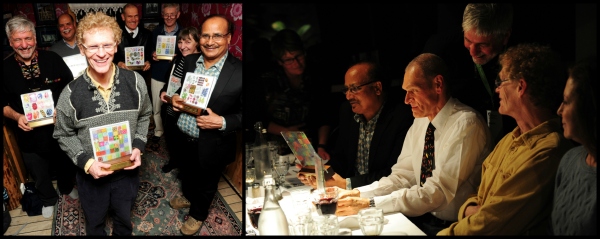
Photos of the awardees by Neil Palmer/Crop Trust.
The Crop Trust Legacy Award recipients
Daniel Debouck—International Center for Tropical Agriculture (CIAT), Colombia
Jean Hanson—International Livestock Research Institute (ILRI), Ethiopia
Ahmed Amri—International Center for Agricultural Research in the Dry Areas (ICARDA), Morocco
Hari D Upadhyaya—International Center for Research in the Semi-Arid Tropics (ICRISAT), India
Dave Ellis—International Potato Center (CIP), Peru
Ruaraidh Sackville Hamilton—International Rice Research Institute (IRRI), the Philippines
Cary Fowler—a visionary of the Svalbard Global Seed Vault who worked tirelessly for its creation and currently a special advisor to the Crop Trust after serving as the organisation’s Executive Director from 2007-2012, a period that saw the Vault being designed and constructed, as well as receiving its first shipments of seeds in 2008.

Photos of the award presented to ILRI’s Jean Hanson by Luis Salazar/Crop Trust and of Jean Hanson holding her award by Neil Palmer/Crop Trust.
From a profile of Hanson by the Crop Trust
‘In the early days of her career, Jean Hanson often wondered what the future would hold and where her career path would take her. Jean, the retiring leader of the Forage Diversity Project at the International Livestock Research Institute (ILRI), wondered out loud to her mentor, the renowned University of Birmingham botanist Professor Jack Hawkes.
‘“Jack replied that it was better not to know so you could be open to new ideas and challenges and make the most of what life has to offer,” Jean said. She followed the sage advice of her mentor throughout her career and followed the opportunities that came her way. . . .
‘While studying for her undergraduate degree, Jean read an article about conservation. That article inspired her to focus her career on conservation efforts and join the famous Birmingham MSc course on genetic resources conservation. Her PhD at the University of Birmingham focused on seed longevity in storage.
‘With a newly minted PhD in hand, Jean embarked on a journey to Mexico and became a post-doctoral student with the International Maize and Wheat Improvement Center (CIMMYT) and managed the center’s maize genebank from 1976 to 1978. With her post-doc complete, Jean accepted a position as a Technical Cooperation Officer for the UK Government and conducted research on storage of recalcitrant seeds of tropical tree fruits in Indonesia. Then, between 1983 and 1985, she relocated to Rome to help the International Plant Genetic Resources Institute (now Bioversity International) with their seed conservation activities, visiting national programs in several countries in order to provide advice on seed storage and genebank management.
‘In 1986, Jean moved to Addis Ababa, Ethiopia to become the genebank manager at ILRI (which was known as the International Livestock Centre for Africa at the time). Three years later she was leading ILRI’s project on forage genetic resources and remained in that position until her first retirement in 2010. “I have stayed true to my original interests and have always worked with conservation of genetic diversity throughout my career, just on different crops in different countries,” Jean said.
‘Jean’s scientific contributions over the last 40 years have earned her international respect and recognition among the crop conservation community. . . .
‘Jean believes that the vast amounts of data generated through genotyping will support more informed decision-making for users as well as the genebanks themselves. “The data is giving us a better understanding of population structure and trait distribution,” Jean said. “We can now better identify duplicates and redundant copies, and change the way we look at and manage accessions as genotypes or populations.” This, along with the introduction of DNA barcoding and Digital Object Identifiers for managing and tracking accessions, will significantly change the management of genebanks over the coming years. . . .
‘[G]enebank management is fundamentally important to food security. Genebanks continue to play a critical role in not only maintaining an archive of biodiversity, but also as sources of information for exploiting that diversity in order to overcome food insecurity in increasingly uncertain times. “Some species and genotypes are already lost and others will be lost in future,” Jean said. “Genebanks may be the only source of some of the diversity available in the past.”. . .
I would like to be remembered for establishing a functioning, well-organized and documented genebank. But I think the people who carry on after me will be the legacy that I leave behind.
—Jean Hanson
‘Her colleagues at ILRI certainly believe she has defined her legacy. “ILRI is incredibly fortunate to have had such a dedicated professional genebank manager for over 30 years,” said ILRI’s Director General Jimmy Smith. “Jean has tirelessly contributed her outstanding expertise of genetic resources management and conservation to nurture ILRI’s 19,000 forage accessions. ILRI’s is the only CGIAR genebank dedicated entirely to forage species and Jean has maintained the profile of this rather unique collection of genetic resources. She will remain part of the ILRI family and we look forward to continuing to benefit from her passion for science, a passion only matched by her ability to clearly communicate her work and why it matters so much.”. . .’
Read the news release from the Crop Trust: Crop Trust to recognise the ‘global gatekeepers’ of crop diversity, 21 Feb 2018.
Watch a video short on the Crop Trust’s 2018 Legacy Awards:
The Crop Trust Legacy Awards, 2018 from Crop Trust on Vimeo.
Read the full profile of Jean Hanson on the website of the CGIAR Genebank Platform: Jean Hanson: Building the next generation of genebank managers—Recipient of the inaugural Crop Trust Legacy Award, by Nicola Temple, Scriptoria, and Michael Major, Crop Trust, 22 Feb 2018.
Read more about ILRI’s genebank on the ILRI News blog:
Creating a science hub in Ethiopia, 25 Apr 2017.
ILRI opens state-of-the-art genebank and bioscience facilities in Ethiopia, 24 Apr 2017.
The Crop Trust an international organisation that is working to support crop conservation in genebanks, forever. It supports international genebanks, national genebanks and the world’s back up facility, the Svalbard Global Seed Vault. The Crop Trust allocates funds to support genebanks through the Crop Diversity Endowment Fund—a self-sustaining fund that generates investment income to support crop conservation. The Crop Trust is recognized as an essential element of the funding strategy of the International Treaty on Plant Genetic Resources for Food and Agriculture. www.croptrust.org.
The Svalbard Global Seed Vault is the largest collection of crop diversity in the world. Located in Longyearbyen, Svalbard, the Seed Vault is owned by the Norwegian Government and operated under a three-party agreement between the Norwegian Government, the Nordic Genetic Resources Center (NordGen) and the Crop Trust. Depositors to the Seed Vault own the samples that they deposit and only they can retrieve the material.
The CGIAR Genebank Platform enables CGIAR Research Centers to fulfill their legal obligation to conserve and make available 750,000 accessions of crops and trees on behalf of the global community under the International Treaty on Plant Genetic Resources for Food and Agriculture. The Platform supports day-to-day genebank operations, and activities to improve efficiency, enhance use and ensure compliance with international policy. This work is supported by donor contributions to the CGIAR Fund. For a list of Fund donors please see: http://www.cgiar.org/who-we-are/cgiar-fund/fund-donors-2/. Additional funding comes from the Crop Diversity Endowment Fund.
CGIAR is a global research partnership for a food-secure future. CGIAR science is dedicated to reducing poverty, enhancing food and nutrition security, and improving natural resources and ecosystem services. Its research is carried out by 15 CGIAR Centers in close collaboration with hundreds of partners, including national and regional research institutes, civil society organizations, academia, development organizations and the private sector.
Sophie Munns is a visual artist from Australia whose is passionate about crop diversity—especially seeds. Through her work, Sophie aims to highlight the age-old relationship between people and plants.






